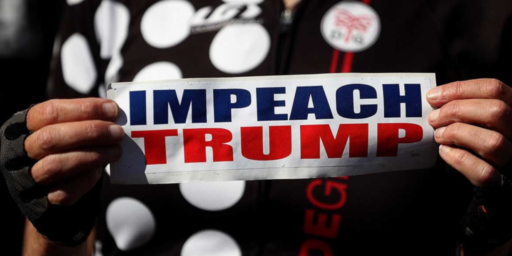Virtues of Divided Government
It’s true that gridlock has been the norm in recent decades, with Democrats usually controlling at least one House of Congress and Republicans usually winning the presidency. This, however, almost certainly reflects the vagaries of our electoral system rather than some conscious choice for divided government.
For one thing, the “Democrats” that controlled the House of Representatives from 1955-1995 were really two parties, with the large cohort of Southern Democrats (or “Dixiecrats”) gradually being replaced by Republicans in the 1980s onward. For another, we elect presidents and Senators on a state-by-state basis and Representatives on a district-by-district basis, making aggregate policy preferences impossible to gauge on the basis of election outcomes.
Few people consciously split their ticket for the sake of “balance.” Indeed, it would be quite absurd to vote for a Ronald Reagan or Jimmy Carter and then deliberately seek to undermine that choice by pulling the lever for ideological foes in the legislature. To the extent ticket splitting occurs, it is almost always because of the overwhelming advantage of incumbency in Congress, especially the House.
The second premise, that divided government provides conservative outcomes, is more plausible but also difficult to test. After all, we’ve had one party control only for short periods: (off the top of my head) the first two years of the Eisenhower presidency, the Kennedy-Johnson years, the Carter administration, the first two years of the Clinton administration, and parts of the Bush administration. Given that most of those periods coincided with expensive wars, the data are necessarily skewed.
If by “conservative” we mean spending less money and passing fewer laws then it stands to reason that gridlock would make it harder to get things done. Then again, it could well result in more pressure for logrolling. The easiest way to “compromise” when buying on credit, after all, is to say “both.”
On the other hand, if by “conservative” we mean turning back social spending, appointing judges who will interpret the Constitution narrowly, and advancing a particular social agenda, it would stand to reason that Republican control would be more likely to achieve those ends.
There again, though, there’s little data by which to test those assumptions. The only ostensibly conservative Republican president who had majorities in both Houses is the current one and it’s hard to argue that conservatives controlled the Senate. Until losing the majority outright in the last election, the Republicans had razor thin majorities, including a 50-50 split that was briefly taken away by a single defection. Those majorities, furthermore, included a handful of Northern Republicans who would fully acknowledge that they’re not conservatives. And, of course, one needs a working majority of 60 votes to get anything controversial through the Senate, anyway.
It’s true that the Republicans spent money like drunken sailors during the few years they had control and that President Bush didn’t veto this profligacy. Many would argue that this just proves that Bush and many of the Republicans in Congress aren’t really “conservatives” in any meaningful sense.
While probably true, it’s mostly a reflection of the political realities in the country. There just isn’t any strong consensus for the libertarian-conservative agenda. Most Americans seemingly want the federal government to provide more services without raising taxes. That’s the best of all worlds from a short-term consumption and candidate re-electability standpoint. It’s the antithesis of conservatism, though.
Bartlett’s strategic advice is rather odd, too:
Therefore, if Republicans were to run a national campaign reminding voters that the best economic times we’ve had in living memory came when we had a Democratic president and a Republican Congress, I think it could persuade a lot of voters to split their votes. If, on the other hand, Republicans insist of believing that they can hold the White House and put all their eggs in that basket, then we could have a nightmare scenario where Democrats in Congress are free to enact bad legislation with no restraint.
It’s simply absurd to think that a major political party would openly abandon its quest for an open presidential seat, especially when the last two contests have been so closely decided. Despite the current dismal poll numbers, it’s likely that 2008 will also be close, even though I give the Democrats the edge.
Moreover, the scenario by which the Republicans take back the Senate and not the White House escapes me. The electoral map in the Senate — where there will be far more open and closely contested Republican than Democratic seats — overwhelmingly favors the Democrats. Absent an incredibly unlikely Reagan-like win with a major coattail effect, I don’t see how the GOP takes back the Congress in 2008.






I’m having difficulty making heads or tails out of either Bartlett’s or McQ’s posts. It seems to me that there are two distinct issues: whether Americans like split government and whether a conservative agenda has made inroads under split government. Neither post deals much with the merits of the first proposition—they seem to take it as a given.
The second proposition hinges on conflation. There are many different strains of conservativism, any number of which have little in common with the others.
Social conservatives haven’t been successful in maintaining or furthering their agenda since the 1950’s. They’re fighting a delaying action. There’s no “success” to measure against.
Fiscal conservatives had a temporary period of success during the Clinton Administration. When are people going to figure out that was the anomaly rather than the norm?
Small government conservatives have little to write home about, either. Where are the great triumphs? Eliminating AFDC. It took them 60 years and it’s been downhill since then.
Their protestations to the contrary notwithstanding libertarians have done pretty well over the last 60 years, regardless of who was running the show and occupying which offices. Whether the country is better off for it is a mixed bag.
Luckily the Dummocrats are running a slate of terror-loving ding bats.
Did you know that, not once in the debates have the words “Islamic terrorist.”
Republicans will win handily both Houses of congress and the Presidency, so we can get back to being a united country again.
Of course, if the Democrat party happens to steal more votes than the Republicans in ’08, Bush will do the right thing and remain in office for a third term, in order to secure our freedom.
Triumph:
You can stop posting comments now, nobody cares.
Thank you.
Freedom is on the march.
Always the victim, eh? It couldn’t just be that your comments are a waste of your’s and my time, plus space on someone’s server.
All bets are off if there’s another major terrorist attack on American soil before the election. (Please do not misinterpret me as saying that I want that to happen, because I don’t.)
How do you see a terrorist attack on US soil between now and the ’08 election being used to Republican political advantage?
Mostly, it has to do with the democrats not taking the situation all that seriously. Poll after poll has been showing that that’s the opinion of how the democrats have been dealing with Islamic terrorism. Is that supposed to change, once an attack occurs? I don’t think so.
As to the discussion over “divided government” I get into discussions about this in the past with Bruce, and it’s one of the few points that we actually have stopped disagreements on. It seems to me, that when we start talking about “divided government” from Bruce’s point of view, we are counting the blue noses and the red noses and if they come reasonably close to 50/50, that qualifies as being properly ‘divided”.
In my view, what he doesn’t seem to be accounted for, is the number of republicans who invariably vote like democrats. John McCain being one. Arlen Spector, Lincoln Chaffee, and so on. On that basis, by definition, let’s postulate a senate which is precisely balanced at 50% republican, and 50% Democrat. That’s balance is by definition unbalanced in terms of liberal versus everyone else, By virtue of the number of liberal republicans.
You see, the problem, is not so much the parties involved, though that he is a decent indicator, the problem is the underlying principles for each individual. Those are not necessarily reflected by the party label.
The result is a 50/50 balance of democrats to republicans is not going to be enough to halt the tilt to the left. Moreover after 60 years and more of democrat dominated legislatures, even a small republican majority is not going to be enough to overcome the leftist tool that has been established, or even slow it down , given the number of liberal republicans still in the Mix.
I submit that after that long and emanation by the left, what is required to balance the situation is an equally long domination of the legislature’s by the right. Further, that domination has to be in large enough numbers to overcome the RINOs to be effective in repairing the damage.
What I’m suggesting is, gridlock is not what we need. Repair is what we need. What Bruce suggests does not provide repair. As a matter of fact, given the overbalanced to the left, even from republicans, it doesn’t even provide gridlock.
Again, Triumph, you really need to step up the spoofing quality. You’re just mediocre right now. Look at the premiere spoof sites on the net for inspiration: Blogs4Brownback, Landover Baptist, Redstate, etc.
Don’t know which polls you have been looking at but recent polling has Dems with the advantage on terrorism. (about halfway down the page) Dems are more trusted on dealing with terrorism by 46 to 38. The Gallup poll has similar results. (expensive subscription required) This has been more or less consistent since late in 2005.
The rest of your post also reads like a spoof. I guess that is why Andy mistook you for Triumph.
Somehow, I thought I could depend on you or Tano to point that out. The Kool-aid dispenser is down the hall, just to the left.
So, tout polls when they support your preconceived notions and dismiss them when they don’t. Very honest.